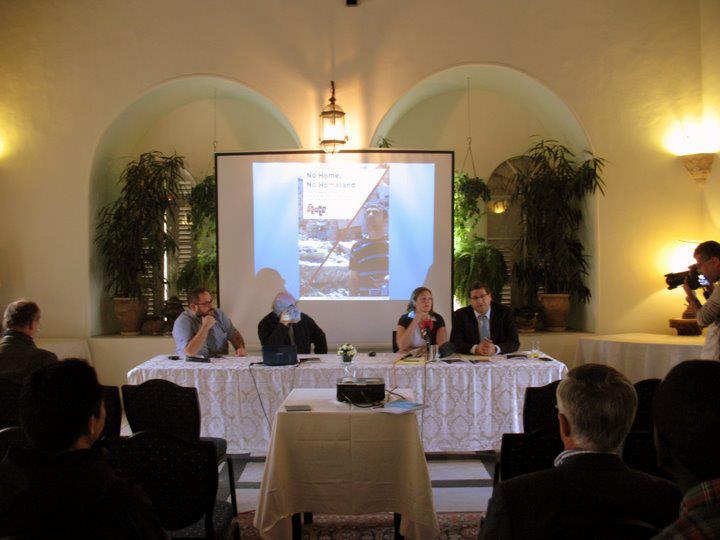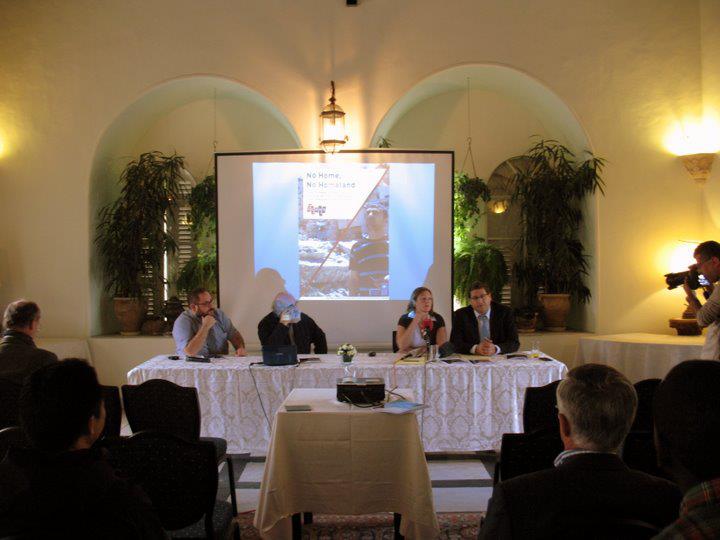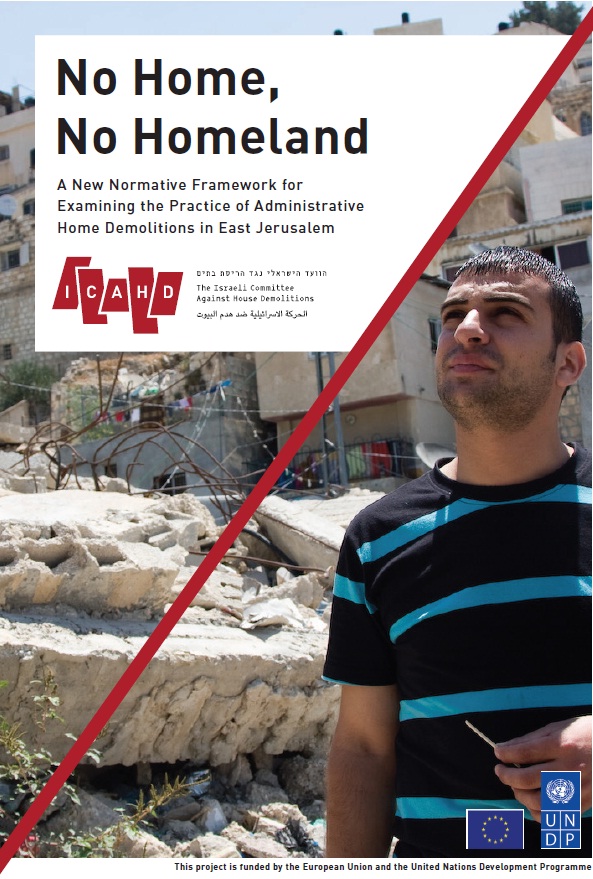No Home, No Homeland: East Jerusalem Ethnic Displacement - Reports
 Friday, November 11, 2011 at 10:34PM
Friday, November 11, 2011 at 10:34PM No Home, No Homeland: East Jerusalem Ethnic Displacement-ICAHD Reports
31 October 2011
The Israeli Committee Against House Demolitions (ICAHD) will submit complaints to the UN's Special Rapporteurs – claiming that Israel's policy in East Jerusalem violates international law and may constitute a war crime.
In a press conference held this morning (Monday, October 31st) ICAHD launched its latest report on illegal Israeli practices in East Jerusalem: 'No Home, No Homeland: A New Normative Framework for Examining the Practice of Administrative Home Demolitions in East Jerusalem". Speaking at the press conference were ICAHD Co-Founder and Director, Dr. Jeff Halper; Co-Director Itay Epshtain, Advocate Michael Sfard, and Advocate Emily Schaeffer. Following the press conference, Dr. Halper led a tour of Ea st Jerusalem, to highlight report findings.

 'No Home, No Homeland: East Jerusalem Ethnic Displacement' Press Conference.
'No Home, No Homeland: East Jerusalem Ethnic Displacement' Press Conference.
ICAHD submitted three complaints this morning to the UN Special Rapporteur on Human Rights of IDPs (Internally Displaced Persons), the Special Rapporteur on Adequate Housing, and the Special Rapporteur on Human Rights in Occupied Palestinian Territories. ICAHD demanded to open an investigation into the legality of Israeli policy in East Jerusalem.
The complaints are based on a report that states that Israel is committing severe violations of international law in East Jerusalem. The report, written by Advocate Emily Schaeffer and edited by Advocate Michael Sfard, analyzes Israeli policy and practice in East Jerusalem under international human rights law and international humanitarian law. The report concludes that Israel is perpetrating serious violations of these laws by denying the right to adequate housing, development, and self-determination, as well as violating the prohibition on residency revocation.
Furthermore, the report states that demolition of Palestinian homes in East Jerusalem is, in the majority of cases, a war crime of destruction of property. By destroying homes, limiting the possibility to build legally, and denying permanent residency status of Palestinians in East Jerusalem, Israel is forcing the migration process on the basis of ethnicity – which violates international law, and is possibly a war crime.
The report also states that there is evidence that the actions and policies implemented by Israel in East Jerusalem are designed to preserve a demographic balance in the city of a Jewish majority – a motive that is forbidden by international law.
The Israeli Committee Against House Demolitions is setting a precedent by turning to the UN. This is the first time that an Israeli organization has requested the opening of an investigation into Israeli practices.
"Seeking justice, we appeal to the international community. UN bodies are better equipped to investigate and rule on Israeli profane policies." Said Itay Epshtain, Co-Director of ICAHD in the press conference this morning. "Unfortunately, the Israeli High Court disregards Palestinians' human rights, in particular their right to adequate, safe and permanent housing, development and national self-determination."
Advocate Emily Schaeffer, author of the report, warned about the consequences of Israeli policies. "The Israeli practices toward East Jerusalem have set in motion a process of displacement of the Palestinians from the city, a process which can only be expected to increase should these policies and practices remain".
East Jerusalem House Demolitions – Background Information
The pretext for home demolitions in East Jerusalem is solely administrative. Administrative home demolitions entail the demolition of homes and structures built without Israeli authorization.
While Palestinians represent about 30% of Jerusalem's population, they live in an area that comprises only 9% of the city. The state of Israel is spearheading a policy for the Jewish population of Jerusalem to be a majority of 70%, while keeping the Palestinian population at 30%.
To preserve this ethnic ratio, the Israeli government has applied a discriminatory policy against Palestinians in East Jerusalem. One of the expressions of that policy is the extreme difficulty in planning and building new homes. Applications to rezone or increase density are regularly denied, as are applications to build in the small areas that are allocated for residential construction. Palestinians therefore have no opportunity to lawfully meet the housing needs of a growing population.
Palestinians in East Jerusalem hold permanent resident status, and it can be lost if they do not permanently reside in East Jerusalem. Therefore they struggle to stay in the area, but Israeli administrative policy poses a bureaucratic wall that makes it almost impossible for Palestinians to legally build homes.
Israeli policy leaves Palestinians nothing but two choices: stay in the area, build irregularly, and risk a demolition and forced displacement from their homes, or leave East Jerusalem, and endanger their residency status that includes losing the right to return to their homes.
If Palestinians have their residency revoked, they are rendered stateless and residency-less. That violates the right to practice self-determination, and the right to citizenship, residency and nationality, enshrined in international human rights law. This forced deportation, on the basis of ethnicity, is a violation of international law and may constitute a war crime under international humanitarian law.
Demolition of houses in and of itself is a denial of Palestinians' right to adequate housing. Demolitions have major implications for the victims: the families whose homes are destroyed are not given alternative housing or compensation. A significant number of them spend months in makeshift tents or in the streets following the demolition of their homes. In addition to the loss of value of the home, and the destroyed property, owners are expected to pay heavy fines of tens of thousands of ILS.
Since 1967, Israel has demolished more than 2,000 homes in East Jerusalem. Between 2000 and 2011, 771 homes were demolished. The number of demolition orders issued to homes in the area currently stands at about 1,500.

For a presentation highlighting the report findings:
http://prezi.com/9ybxyke9ze0x/no-home-no-homeland/
To download the ICAHD publication 'No Home, No Homeland: A New Normative Framework for Examining the Practice of Administrative Home Demolitions in East Jerusalem':
------------------------------------------------------------------------
Nowhere Left to Go: Arab al-Jahalin Bedouin Ethnic Displacement
ICAHD launches new publication to highlight growing risk of displacement for Jerusalem periphery Bedouin.
The Palestinian-Bedouin communities living in the hills to the east of Jerusalem are at an exceedingly growing risk of forced ethnic displacement. The communities have been informed by the Israeli authorities that they have no option but to leave the area, as part of a larger plan (to begin as early as January 2012) to relocate Bedouin communities living in Area C (Jerusalem periphery, Jordan Valley, and south Hebron Hills), where Israel retains control over security as well as planning and zoning.
The Bedouin homes are currently located in an area that holds strategic significance for further expansion of illegal Israeli settlements. This includes the E1 plan, which foresees the expansion of Ma’ale Adumim, an illegal Israeli settlement, and its linkage to Judaized East Jerusalem and Jordan Valley settlements. If implemented, these plans, along with Barrier construction in the area, risk preventing Palestinian growth and development and disrupting the territorial contiguity of a future Palestinian state. The forced displacement of the Bedouin would also be detrimental to their semi-nomadic way of life. As available land shrinks, Bedouin refugees are faced with nowhere to go.
Meanwhile, the Arab al-Jahalin Bedouin are seeking ways to improve their general living conditions. Communities living in the area have appealed to local and international organizations to support projects that will contribute to improving their conditions, projects designed help the Bedouin to build sustainable livelihoods and resist forced ethnic displacement and the Israeli Occupation.

To download the ICAHD publication Nowhere Left to Go: Arab al-Jahalin Bedouin Ethnic Displacement:
------------------------------------------------------------------------
Khan al-Ahmar Homes Demolished
Five family homes were demolished this morning (Monday, October 31st) in the Jerusalem periphery Palestinian-Bedouin community of Khan al-Ahmar.
15 army jeeps and a bulldozer showed up at the rural community, in the hills east of Jerusalem this morning, and demolished five family homes, displacing 71 people, including some 60 children.
ICAHD staff arrived at the community a few short hours after the demolition to find family members mourning the loss of their homes and property. Abu Khamis, a Khan al-Ahmar community activist told ICAHD staff: 'We will not be forced off our land, if Israel demolishes, we will rebuild'.
The recent house demolitions are part of an ongoing policy designed to forcefully transfer Bedouin of the Jerusalem periphery, as highlighted in the ICAHD publication 'Nowhere Left to Go: Arab al-Jahalin Bedouin Ethnic Displacement'.
------------------------------------------------------------------------
Donations to ICAHD are always welcome. Your online donation goes directly to rebuild homes and support ICAHD's advocacy programs in Israel and acroos the world. Your gift makes this important work possible.
 APJP |
APJP |  Post a Comment |
Post a Comment |